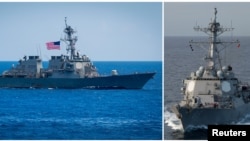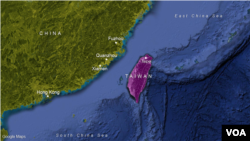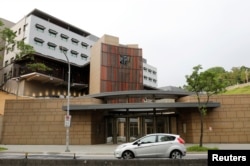China’s protests this month over a surge in relations between its rival Taiwan and the United States may prompt eventual retaliation by nervous officials in Beijing, analysts say.
The head of the Chinese government’s Taiwan Affairs Office said July 8 China “cannot accept” growth in Taiwan-U.S. relations.
That comment was a response to the passage Saturday of two U.S. warships through the ocean strait separating Taiwan from China.
China resents U.S. support because it sees self-ruled Taiwan as part of its territory rather than a country with rights to foreign relations. The United States strong military also adds to concerns among Communist officials as they grapple with ways to bring Taiwan under its flag.
Taipei and Washington have been exploring a closer relationship since U.S. President Donald Trump took office last year and Taiwan President Tsai Ing-wen took power in 2016.
“After the new governments of the U.S. and Taiwan formed, after Trump and Tsai Ing-wen took office, the situation is definitely one that the Chinese do not want to see,” said Gratiana Jung, a senior political researcher with the Yuanta-Polaris Research Institute think tank in Taipei.
Testing China’s patience
On Saturday the United States sailed two warships, the USS Mustin and USS Benfold, through the Taiwan Strait, the Ministry of Defense in Taipei said.
The U.S. Navy has sent ships to the same 160 kilometer-wide (100 mile-wide) waterway in the past but this time Taiwan noted it publicly and pledged to “perfect its responsibilities as a regional player."
The United States may have used this voyage to alert China to the strength of U.S.-Taiwan relations, said Andrew Yang, secretary-general of the Chinese Council of Advanced Policy Studies think tank.
Washington sees Taiwan as part of its “pearl chain” of allies that support U.S. aims in the Asia Pacific, said Joanna Lei, chief executive officer of the Chunghua 21st Century think tank in Taiwan. One of those aims is containing China’s expansion, experts believe. Other allies include Japan, South Korea and the Philippines.
Media reports from Washington say the U.S. State Department has requested that the Marines help guard a new de facto embassy compound in Taipei.
A series of decisions by Trump and actions by the U.S. Congress had already grabbed China’s attention.
Legislation signed by Trump in March encourages more senior-level U.S.-Taiwan visits despite opposition from Beijing, for example, and Washington openly opposes Chinese demands that 44 international airlines quit referring online to Taiwan as a “country.”
Last year the U.S. government announced a $1.42 billion package of advanced weaponry for Taiwan’s military.
Bristly Chinese reaction
China would see a deployment of Marines in Taiwan, even if it is just to defend U.S. property, as a “permanent upgrade” in relations, Denny Roy, senior fellow at the East-West Center, a research organization in Honolulu.
China’s Taiwan Affairs Office Director Liu Jieyi said in response to the warships that Taiwan should “recognize the true intent” of being played as a “card” by the U.S. government.
“Absolutely you don’t want anyone to help the United States play a Taiwan card, hurting the people on both sides and the interests of Taiwanese people,” Liu was quoted saying.
U.S. military support for Taiwan implies aid from Washington if China were to attack Taiwan. But passage of U.S. warships is not Taiwan’s “fault,” said Shane Lee, a political scientist at Chang Jung Christian University in Taiwan.
“You cannot punish Taiwan for what the U.S. did,” Lee said. “Of course, China doesn’t want Taiwan to get closer to the U.S.”
Some believe Trump is using Taiwan to rattle China into giving concessions on trade as he proposes tariffs against Chinese goods sold in the United States.
Follow up by Beijing
China will probably follow up by doing more to make Taiwanese youth and business people see the benefits of its roughly $12 trillion economy, Jung said.
China approved a list of measures in February making it easier for Taiwanese to work and invest.
Beijing has claimed sovereignty over Taiwan since the Chinese civil war of the 1940s, when the losing Nationalists fled to Taiwan and reestablished their government.
The two sides have been separately ruled since then, but China insists on eventual unification despite government opinion polls in Taipei showing that most Taiwanese oppose that outcome.
China may also establish a “line,” possibly through military channels, that Taiwan and the United States should avoid crossing, Lei said. That measure might resemble Beijing’s anti-secession law, she said. The 2005 law authorizes use of force against Taiwan if it declares legal independence from China.
“They will draw clear red lines, so that Taiwan understands where the boundaries might be and the U.S. understands what actions might trigger further retaliations or responses,” Lei said.










